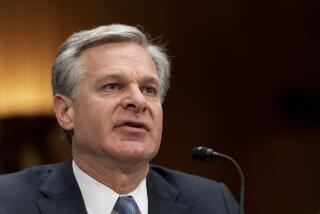Nuclear Weapons Site Still Unsafe, Says Ex-FBI Agent
DENVER â The FBI agent who led the raid on the Rocky Flats nuclear weapons plant in 1989 charged the federal government Wednesday with deceiving the public about cleanup efforts at the facility and said plans for a national wildlife refuge there were irresponsible.
âPublic recreation at Rocky Flats is a foolish idea driven by politics, not by facts,â said Jon Lipsky, who took early retirement from the FBI to speak out against the refuge. âItâs dangerous and scientists say they canât make it safe.â
Lipsky and other critics held a news conference Wednesday where they said the U.S. Department of Energy and the Justice Department had minimized the extent of radioactive contamination at the site to save money and not alarm local residents. Lipsky said radioactive ash, contaminated soil and water still posed hazards but were being ignored by the government. The 6,420-acre site is just west of Denver.
Federal officials deny the allegation.
Wes McKinley, former head of the grand jury that investigated Rocky Flats and now a Democratic state legislator, will introduce a bill requiring future wildlife refuge managers at Rocky Flats to warn visitors about potential dangers.
âIf you go horseback riding, you get a warning. You canât even drink a beer without a warning label,â he said. âI am proposing that information be given to the children and adults about what happened there and what dangers they face going there.â
Rocky Flats began making plutonium triggers for nuclear weapons in 1952. The FBI raided the facility in 1989 after reports surfaced of widespread radioactive contamination on the property. The FBI found numerous violations of federal antipollution laws including massive contamination of water and soil. The Department of Justice investigated but did not prosecute anyone from Rockwell International, which operated the plant for the government. Rockwell was fined $18.5 million.
Since then, a $7-billion cleanup effort has been underway and is scheduled to conclude next year.
âThese allegations are absurd,â said Karen Lutz, Department of Energy spokeswoman. âWe have interviewed hundreds of former workers, examined tens of thousands of pages of documents and have done extensive sampling. Every aspect of this cleanup has been under a microscope for the last 15 years. When you look at the involvement of the community and oversight of regulators, itâs hard to think how there could be a cover-up.â
David Abelson, who heads the Rocky Flats Coalition of Local Governments, a group of communities near the site that monitors the cleanup, said much of what Lipsky said might be true but was old news.
âI have no qualms about 99.9% of what he said but the leap he made, that the cleanup was dangerous, I canât go along with,â he said. âHe needs to look at new data. The local governments feel highly confident in the cleanup. There is no bit of information we have asked for that has been turned down.â
Lipsky said the FBI muzzled him when he tried to discuss Rocky Flats and punished him with a transfer from Denver to Los Angeles after he testified before Congress in 1992 about the nuclear facility. He retired last week. A spokesman for the Justice Department was unavailable for comment.
âIt would be a grave mistake for anyone to rely on what Justice or the Department of Energy said about the level and extent of contamination at Rocky Flats,â he said. âThe public needs to ask for a congressional investigation. Maybe we will save a life.â
More to Read
Sign up for Essential California
The most important California stories and recommendations in your inbox every morning.
You may occasionally receive promotional content from the Los Angeles Times.









